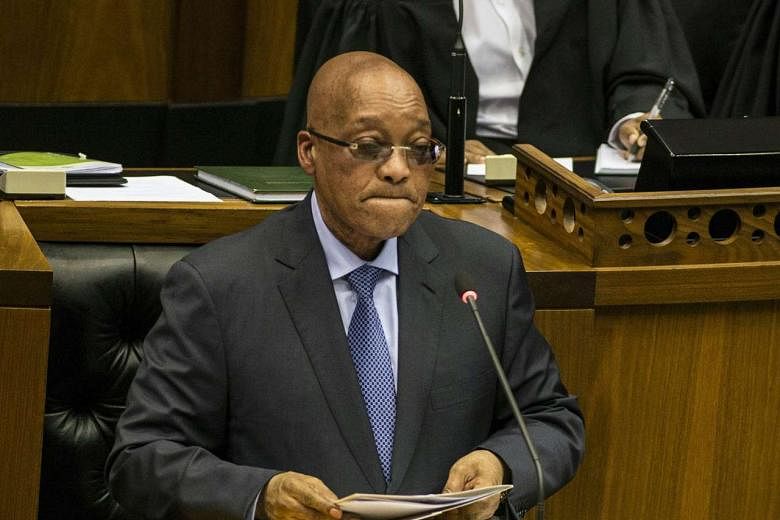CAPE TOWN (AFP) - South African President Jacob Zuma easily survived an impeachment vote on Tuesday after a stormy session of parliament over a court ruling that he had violated the country's post-apartheid constitution.
Lawmakers from Zuma's African National Congress (ANC) rallied to his defence, defeating the motion by 233 votes to 143 despite growing pressure for him to resign over the scandal.
During the debate, Zuma was likened by the leader of the main opposition party to a "large and malignant tumour" on the ANC, which came to power in 1994 with the election of Nelson Mandela and the end of white-minority rule.
"When the highest court in the land ruled that the man occupying the highest office violated the constitution, it should have been the end of President Zuma," Mmusi Maimane, leader of the Democratic Alliance, told the assembly.
"Corruption has infected the entire party like a cancer."
Acknowledging that the ANC would use its overwhelming majority to defeat the impeachment motion, Maimane said that "when ANC MPs defend President Zuma and his corrupt acts, they will show that they are complicit in the spread of the disease".
He vowed the ANC, which convincingly won the 2014 general elections, would pay the price when voters return to the polls.
The Constitutional Court last week issued a damaging ruling against Zuma over spending of public funds on his private residence.
As lawmakers on both sides shouted insults at each other, the firebrand leader of the radical Economic Freedom Fighters, Julius Malema, said that "Zuma and the ANC want to convert South Africa into a banana republic".
Speaking on behalf of the ANC, deputy justice minister John Jeffery said that any impeachment bid required a "serious violation" of the constitution.
While "the Constitutional Court judgement stated that the president failed to uphold, defend and respect the Constitution", it did not find a "serious" contravention, he said.
The opening of the debate was suspended for more than an hour after opposition parties called on Speaker Baleke Mbete - who is chairwoman of the ruling party - to recuse herself. She refused.
Zuma was not seriously threatened by the vote, which requires a two-thirds majority to succeed.
But he has been wounded by a series of scandals and has endured a torrent of criticism that could see him fail to serve out the last three years of his final term.
He has been urged to resign by a number of senior ANC veterans who led the struggle against apartheid.
The country's top court ruled last Thursday that Zuma had flouted the constitution by failing to repay some of the money spent on "security upgrades" at his rural home at Nkandla in the eastern province of KwaZulu-Natal.
The project, which cost taxpayers US$24 million (S$32 million), included a swimming pool, chicken run, cattle enclosure and an amphitheatre.
A 2014 report by the government-appointed Public Protector, Thuli Madonsela, found that Zuma and his family had "unduly benefited" from the upgrades and ordered him to pay back some of the money, but Zuma stalled for two years.
After the court ruling, Zuma apologised in a national television address on Friday for the "frustration and confusion" caused by the affair, but made it clear that he had no intention of responding to calls to resign.
He said he would pay back some of the money as ordered.
Zuma was not in parliament for the impeachment debate, avoiding the chaotic scenes that have regularly erupted when he is present.
Previous disruptions have been sparked by Malema's EFF, which vowed last week that it would in future physically prevent the president from speaking in parliament.
Zuma has also been beset by allegations of corruption centred on a wealthy immigrant family from India that was alleged to have such influence that it could decide ministerial appointments.

